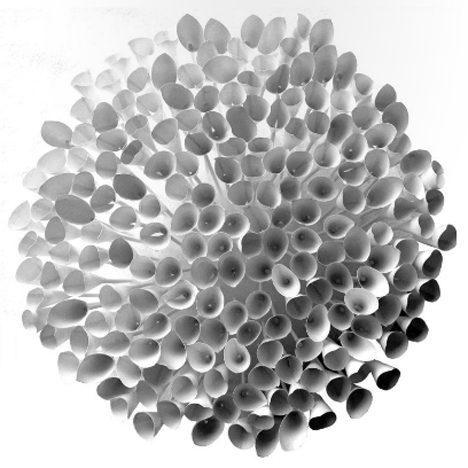News: New York design studio Atopia has moved to defuse the row over the authorship of the 2012 Olympic cauldron, saying: "we have never accused Thomas Heatherwick of plagiarism".
Atopia, which presented a concept for a pavilion (top image and below) at the London games to organisers LOCOG in 2007, has published a statement on its website distancing itself from media reports that UK designer Heatherwick copied its design.
“We have never accused Thomas Heatherwick of plagiarism," says the statement. "We have never claimed to be designers of the cauldron in spite of claims in the press."
Instead, Atopia says it believes its "narrative scenario" for the pavilion inspired LOCOG. "All we have sought from LOCOG since July 2012 is a formal acknowledgement of this.”
"We are entirely focused on the issue of how ideas transmit through large organizations, often organically and unconsciously," the statement says.
The firm adds: "The issue for us is not about the object nor is it about Heatherwick’s design. It does bear a striking resemblance to our project work and sketchbook from 2008 and as such this has been the point of focus of the press."
Atopia has also published its sketchbook of ideas for the London 2012 Olympics, showing how the proposed One Planet pavilion would be constructed from "umbrellas" that would be carried into the stadium by representatives of the competing nations as part of the opening ceremony and assembled into "a lightweight canopy for events". This canopy would be made from "a large number of umbrellas like flowers". The images shown in this story come from Atopia's sketchbook.
The presentation continues: "After the games the umbrellas are removed in another ceremony launching a new journey for each of them... returning to the participating nations."
The row over the design of the cauldron emerged earlier this week when UK newspaper the Guardian published a story highlighting the similarities between Atopia's proposal and the Heatherwick's cauldron (above and below), which became one of the most enduring and popular symbols of the games.
Heatherwick's design featured 204 copper "petals", each representing one of the competing nations. The petals were carried into the stadium by representatives of each team during the opening ceremony and then assembled into a flaming cluster. At the end of the games the petals were sent as gifts to each nation.
Heatherwick, who was awarded a CBE earlier this month for his work on the cauldron, has emphatically rejected claims of plagiarism, saying; "This claim is spurious nonsense. The ludicrous accusation that LOCOG briefed us to work with, develop or implement a pre-existing idea and that we acted in accordance with this briefing is completely and entirely untrue."
See a movie about the design and testing of Heatherwick's Cauldron. See all our stories about Thomas Heatherwick.
Below is the full statement from Atopia's website:
Atopia London 2012 Press Statement
“We have never accused Thomas Heatherwick of plagiarism. We have never claimed to be designers of the cauldron in spite of claims in the press. We are entirely focused on the issue of how ideas transmit through large organizations, often organically and unconsciously. This becomes an even more complex issue when work and material submitted by small organizations is subject to stringent Confidentiality Agreements.
The issue for us is not about the object nor is it about Heatherwick’s design. It does bear a striking resemblance to our project work and sketchbook from 2008 and as such this has been the point of focus of the press. But for us this is not the point. It is the written narrative that we are concerned with as this is key component in the way we work, developing scenarios for clients that allow them to imagine possibilities years ahead of time and catalyze thinking within their organizations to deliver socially engaged innovation. It is the narrative scenario along with our other tender content that we believe proved inspirational at LOCOG and this is what it was intended to do. All we have sought from LOCOG since July 2012 is a formal acknowledgement of this.”

